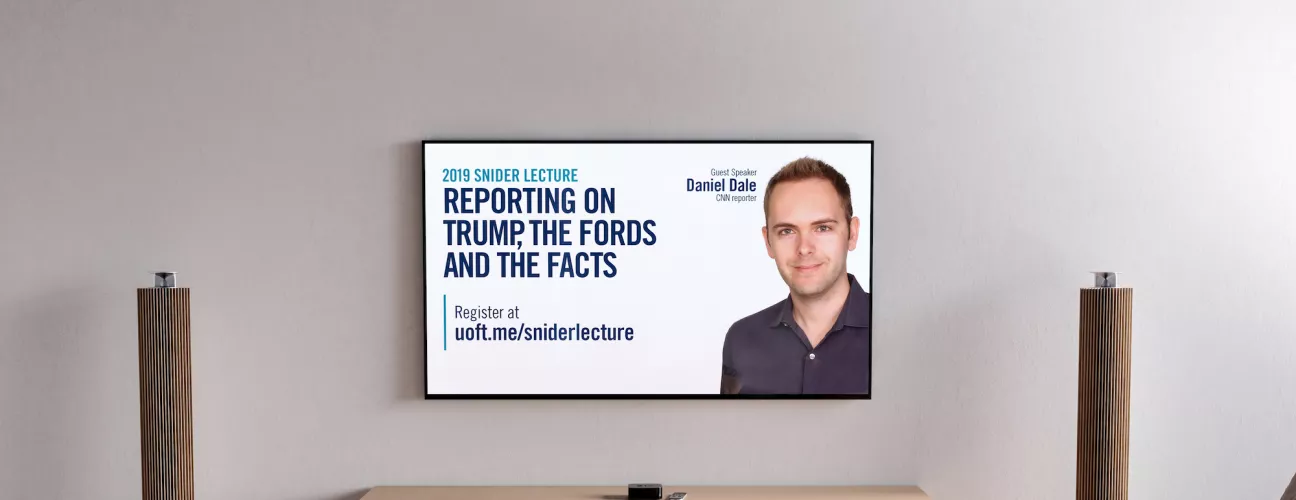
Request Digital Signage Support
Quick Reference Guide
- Files should be 1920 pixels wide by 1080 pixels high.
- Image files: JPEG or PNG (no PDFs or PowerPoint files).
- Follow this naming convention: Expiry Date - Office/Dept. - Keyword (i.e. ExpSep8-Communications-DayOfPlay.jpg).
- The maximum duration of a standard posting is two weeks.
- Do your best to adhere to U of T visual identity guidelines.
- No more than two post requests at a time.
UTM reserves the right to refuse or remove any digital signage content that does not portray UTM, U of T, its departments, services, activities, personnel or students in a positive light. Other avenues exist for the communication and discussion of such content.
Digital messaging is generally appropriate for:
- Promoting departmental information, including on-campus programs and services, and campus-related news (including important dates and deadlines)
- Supporting campus way-finding
- Promoting campus campaigns (e.g. hand-washing during flu season, reporting graffiti)
- Recruitment of research study volunteers
- Messaging for external/public events (by Advancement and Conference Services)
Digital messaging is not appropriate for:
- Material that may reasonably offend community member and campus guests (including youth) through provocative messages, text and/or images
- Material with audio content
- Material which advocates for particular political parties, candidates or campaigns
- Material that is protected by copyright
- Material that may violate individuals’ privacy
- Messages advocating/encouraging the consumption of alcohol, tobacco or drugs, or participation in gambling or games of chance
- Promotion of for-profit businesses and services (e.g. tutoring, commercial test preparation, housing rentals)
- Messages in languages other than English without an accompanying English translation
- Fundraising announcements for causes that are not directly supported and formally endorsed by UTM or U of T.
Posting information
Infrequent or occasional content providers should submit requests with proposed content to Patricia Lonergan, Director, Marketing and Communications, Office of Communications or via the Request for graphic design support form.
Posting privileges are granted at the discretion of UTM’s signage system administrators and can be rescinded if messages are posted that do not comply with these guidelines.
Other considerations
While digital messaging can be effective, don’t rely on it alone. Other campus-supported promotional options include email listservs, UTM’s social media feeds, postings on campus bulletin boards, in-course announcements arranged with permission of instructors, advertising and news coverage in the student-run campus newspaper, promotion through student clubs and academic societies meetings and their social media…
- To keep content fresh, users must adhere to the following naming convention: Expiry Date - Office/Dept. - Keyword (i.e. ExpSep8-Communications-DayOfPlay.jpg). Files that do not follow this convention will be removed.
- The maximum duration of a standard posting is two weeks.
- No more than two post requests at a time.
- Given the few seconds that information resides on-screen each time it is displayed, messages should be very brief and easily readable. Avoid use of all-caps, excessive text and long sentences.
- Content providers are encouraged to consider where and when their messages are likely to be most effective, and use the digital signage system’s features to customize display locations, dates and times to target messages appropriately.
- Messages that require or are likely to generate follow-up should include a campus-based department/group name, phone number or website (e.g. ‘For more information, contact…’). For URL’s consider a shortened web address (alias) available through uoft.me instead of a lengthy one. QR codes are also available to direct viewers to your website.
- Messages should be action-focused, inviting action rather than simply sharing news.
- Date-specific messages should note the actual day and date of the event—messages simply noting “today” or “tomorrow”, for example, can be challenging to administer.
- Content providers are responsible for adherence to the relevant copyright and privacy policies and procedures.
- Any content in a foreign language must have an English translation printed on it for approval.
Users designing their own graphics, rather than using a provided template, should abide by the following:
- Files should be 1920 pixels by 1080 pixels
- Image files: JPEG or PNG (no PDFs or PowerPoint files)
- Video files: mp4, mov, or FLV; 25 MB or under in size, preferably no more than 10-15 seconds in duration. Files should be encoded as close to the 860x482 aspect ratio as possible, to avoid unnecessary processing on the computers supporting digital signage. H.264 video encoding standard is recommended for maximum compatibility.
- Audio is not allowed
- Any external logo or combination of logos included in a design must take up less than 10 per cent of the total image size
- If images contain the faces of recognizable individuals, those individuals must have given the content provider signed permission for the use of their photo.
- Content providers must have documented permission to use any image in the file that might be copyrighted. Otherwise, consider using Creative Commons, free stock images or designing an image.
- Aim to adhere to U of T visual identity guidelines.
- Viewers will not stop to read fine print. At 72 dpi, use at least 30pt text
- Consider viewer’s vision and accessibility requirements when designing content. Text and backgrounds should be of reasonable contrast. Some contrast between text and background is helpful; too much is not. Consult on-line resources for examples.
- If you include a QR code, link to a mobile-friendly site
- Content providers are responsible for ensuring that the final product, in the dimension required, meets these minimum standards, and signage administrators reserve the right to delete content that does not meet these requirements.
Requests for exceptions and revisions to these guidelines should be directed to Patricia Lonergan, Director, Marketing and Communications, Office of Communications.
